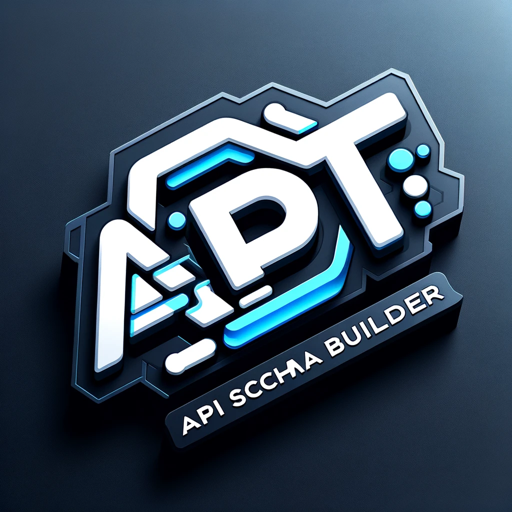OpenAPI GPT-OpenAPI 3.0 spec generation
AI-Powered OpenAPI Spec Generator
Create OpenAPI spec for this website:
Fix my OpenAPI spec:
Related Tools
Load More
GPT Builder 助手
转换 API 代码为 GPT Schema

GPT Actions Builder
Converts websites to OpenAPI specs for ChatGPT Actions

GPT Action Schema Generator
Generates GPT OpenAPI schemas.

API Alchemist
Advanced tool for creating GPT APIs, specialized in code and OpenAPI Schemas.

GPT API Schema Builder
Create an API Spec For You Custom GPT. Instantly turn API docs into OpenAPI specs with our tool! Paste a cURL or a doc link, and get a perfect spec in a snap. It’s quick, easy, and error-free. Perfect for devs who want to save time and hassle.

GPT Action Builder
Builds compliant OpenAPI schemas for custom GPT actions
20.0 / 5 (200 votes)
Introduction to OpenAPI GPT
OpenAPI GPT is a specialized version of ChatGPT designed to assist users in creating OpenAPI 3.0 YAML specifications. Its primary function is to streamline the process of defining and documenting APIs by generating accurate and structured YAML specifications based on the information provided by the user. OpenAPI GPT is particularly useful for developers, API designers, and technical writers who need to create or update API documentation efficiently. By automating the generation of OpenAPI specs, it helps ensure consistency and accuracy in API documentation, reducing the potential for errors and saving time. For instance, if a developer provides a URL to their API's documentation or description, OpenAPI GPT can analyze the content and produce a detailed OpenAPI spec that adheres to industry standards.

Main Functions of OpenAPI GPT
Generating OpenAPI 3.0 YAML Specs
Example
A user provides a link to their API documentation, and OpenAPI GPT analyzes the information to produce a structured YAML specification.
Scenario
A startup developing a new web service needs comprehensive API documentation to share with partners. The developer uses OpenAPI GPT to generate an accurate OpenAPI 3.0 spec from their existing API descriptions, ensuring all endpoints and methods are correctly documented.
Ensuring Compliance with OpenAPI Standards
Example
OpenAPI GPT checks the generated specs for compliance with OpenAPI 3.0 standards, including the use of https for server URLs and assigning operationId to each path.
Scenario
A development team is preparing for an API audit and needs to ensure their documentation meets OpenAPI standards. They use OpenAPI GPT to validate their specs and make necessary adjustments, facilitating a smoother audit process.
Identifying and Correcting Errors in OpenAPI Specs
Example
When a user encounters issues with their OpenAPI spec, OpenAPI GPT helps diagnose and fix the problems by referencing the official OpenAPI specifications.
Scenario
An API designer receives feedback that some parts of their API documentation are not functioning as expected. They use OpenAPI GPT to analyze the YAML file, identify discrepancies, and correct them, improving the API's reliability and usability.
Ideal Users of OpenAPI GPT
Developers
Developers who are building and maintaining APIs benefit from OpenAPI GPT as it helps automate the creation of OpenAPI specs, ensuring consistency and reducing the time spent on documentation. This allows them to focus more on coding and developing new features.
Technical Writers
Technical writers tasked with documenting APIs find OpenAPI GPT valuable for producing clear, accurate, and standardized API documentation. By automating the generation of YAML specs, it helps writers maintain high-quality documentation with less manual effort.
API Designers
API designers use OpenAPI GPT to prototype and document APIs quickly. The tool helps them ensure their API designs adhere to industry standards, making it easier to share and collaborate on API specifications with other stakeholders.

Guidelines for Using OpenAPI GPT
Visit aichatonline.org
Go to aichatonline.org for a free trial without login, and no need for ChatGPT Plus.
Enter API Link
Provide the link to the API you want to create a specification for.
Analyze API
Allow the tool to analyze the API from the provided link, which will help in generating the OpenAPI spec.
Generate OpenAPI Spec
The tool will generate an OpenAPI 3.0 YAML specification based on the API analysis.
Review and Edit
Review the generated spec and make any necessary edits or customizations as needed.
Try other advanced and practical GPTs
ToonSmith
AI-Driven Cartoon Creativity Unleashed

Sally
Uncover the meaning of your dreams with AI-powered insights.

Bitcoin GPT
AI-powered Bitcoin Investment Insights

Job Interview Coach
AI-Powered Interview Practice and Feedback.

Personal Trainer with Common Sense
AI-powered Personal Trainer and Nutritionist

Vinted Product Description
AI-powered vintage item descriptions

Your Tutor
AI-driven solutions for smarter learning.

Dr. Business
AI-powered support for online businesses

Idea to Design
Transforming Ideas into Designs with AI

Secrets of Marketing
AI-driven marketing insights for growth

Landscape Report Beta GPT
AI-powered insights for strategic growth.

SwiftGPT
AI-Powered Assistance for Swift Developers

- Technical Writing
- Software Development
- API Documentation
- Automated Specs
- API Analysis
Common Questions About OpenAPI GPT
What is OpenAPI GPT?
OpenAPI GPT is an AI-powered tool designed to generate OpenAPI 3.0 YAML specifications from provided API links, simplifying the documentation process.
How accurate is the generated OpenAPI spec?
The generated OpenAPI spec is highly accurate, leveraging advanced AI algorithms to analyze and interpret the API details from the provided link.
Can I use OpenAPI GPT for any API?
Yes, OpenAPI GPT supports a wide range of APIs, making it versatile for different applications, whether RESTful or other types.
Do I need technical knowledge to use OpenAPI GPT?
No, the tool is user-friendly and designed to be accessible for users with varying levels of technical expertise.
Are there any customization options available?
Yes, after generating the initial OpenAPI spec, you can review and edit the details to suit your specific needs and preferences.